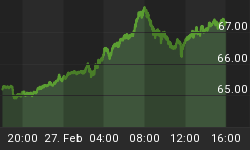The U.S. Dollar finished mixed after a choppy trade on Tuesday. The Dollar began the day weak, but turned around following the release of mixed economic data. A sell-off in the stock market prompted traders to sell higher risk assets.
The Case-Shiller Housing Price Report and the Consumer Confidence report helped trigger the break in the stock market which turned the Dollar around before mid-session. The housing number showed an increase in prices while the consumer confidence report showed an unexpected drop.
The EUR USD gave back all of its early gains to finish lower. Volatility in the stock market prevented the Euro from gaining any really strong support. This market continues to remain sensitive to demand for higher risk assets. A shift in appetite for risk could send the market sharply lower over the near-term. The charts indicate that the retracement zone at 1.4762 to 1.4696 is the next key downside target and support area.
The GBP USD traded a little better but mostly rangebound. The downside target remains 1.6198 to 1.6082. There may be a short-covering rally which takes this market back to 1.6471. This morning it was reported that U.K. retail sales rose to the highest level in two years. This report helped provide some support but just enough to trigger some light short-covering. Traders are still concerned that last week's weak GDP Report will prompt the Bank of England to expand its quantitative easing program.
The USD JPY felt downside pressure all day. End of the month repatriation by Japanese companies was the reason behind today's strength in the Japanese Yen. Technically, a closing price reversal top was formed at 92.32. This formation indicates a short-term break to 91.20 to 90.94 is likely.
The USD CAD finished lower. Volatility was highlighted throughout the day in both the equity and crude oil markets. Now that the upside target in this currency pair has been reached, traders are now waiting for a correction. Today's closing price reversal top indicates the start of a possible break to 1.0461 to 1.0401.
Volatile equity markets helped keep a lid on the early rally in the AUD USD and NZD USD. Overnight China announced that its industrial production will be up during the 4th quarter. This helped the Aussie and Kiwi rally nicely in the morning, but these gains were lost after the equity markets began their break. By the end of the day however, prices were able to stabilize and the currencies remained unchanged. Both the Aussie and the Kiwi remain sensitive to economic news out of China.















